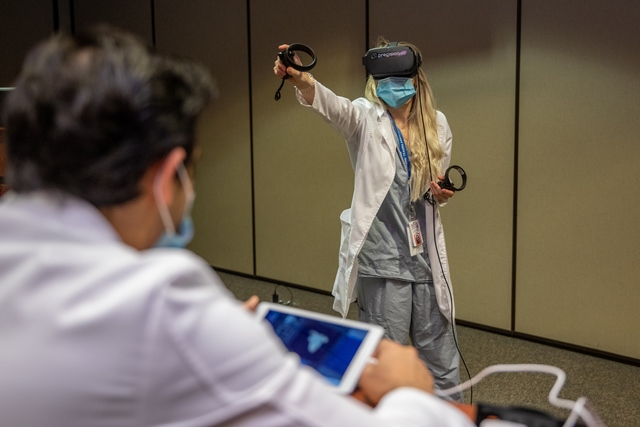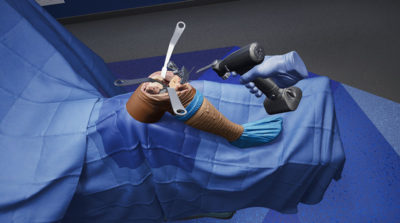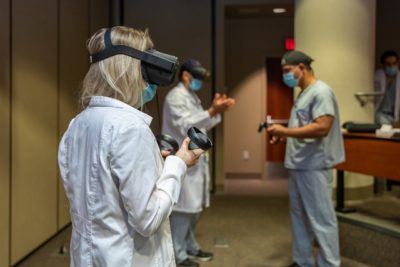
By Elaine Mitropoulos
Through virtual reality technology, St. Joseph’s Healthcare Hamilton, a teaching hospital affiliated with the world-renowned McMaster University, continues to provide cutting-edge educational experiences that are allowing orthopaedic surgeons in training to sharpen their skills during the pandemic.
 Dr. Vickas Khanna, Orthopaedic Surgeon at St. Joe’s and Orthopaedic Surgery Residency Training Program Director at McMaster University, says the virtual technology is filling a void in training residents while restrictions imposed by COVID-19 are in place, including limitations on elective surgeries.
Dr. Vickas Khanna, Orthopaedic Surgeon at St. Joe’s and Orthopaedic Surgery Residency Training Program Director at McMaster University, says the virtual technology is filling a void in training residents while restrictions imposed by COVID-19 are in place, including limitations on elective surgeries.
“Pilots do much of their training in a simulator before actually flying a plane,” Dr. Khanna says. “This technology is similar. Residents can become adept at doing a surgery virtually before doing it in real life with confidence.”
 With a head set and two controllers that act as surgical tools, the unique technology simulates elbow, knee, and hip replacements. The platform allows the residents to perform surgery on realistic, life-like patients – from implant to positioning to drilling and hammering.
With a head set and two controllers that act as surgical tools, the unique technology simulates elbow, knee, and hip replacements. The platform allows the residents to perform surgery on realistic, life-like patients – from implant to positioning to drilling and hammering.
Before the pandemic, Dr. Marianne Comeau-Gauthier, a first-year resident, was in the operating room training almost daily. Today, virtual reality allows her to continue to advance her skills while the hospital gradually resumes elective surgeries.
“With virtual reality, you are completely in another world and can practise and focus on the task at hand,” she says. “It’s something every resident should do before going into the operating room.”
Dr. Muzammil Memon, a St. Joe’s resident in his third year, says virtual reality training complements traditional surgical training.
“Virtual training walks you through complicated surgical steps so you can build an internal rhythm for what comes next,” he says. “It’s an experience residents wouldn’t necessarily get watching a real-life surgery in the operating room.”
Dr. Khanna foresees other surgical specialties at the hospital leveraging virtual reality training during the pandemic, and long after it’s over.
“With virtual reality, you can go back over complicated procedures. In a real operating room, you can’t cut twice,” Dr. Khanna says. “My hypothesis is those who train virtually will be more prepared, confident, and comfortable with surgeries in the real world.”
Interactive virtual reality training is being delivered to the hospital’s orthopaedic surgeons in training through the Precision OS platform.
Elaine Mitropoulos works in Public Affairs at St. Joseph’s Healthcare Hamilton.

